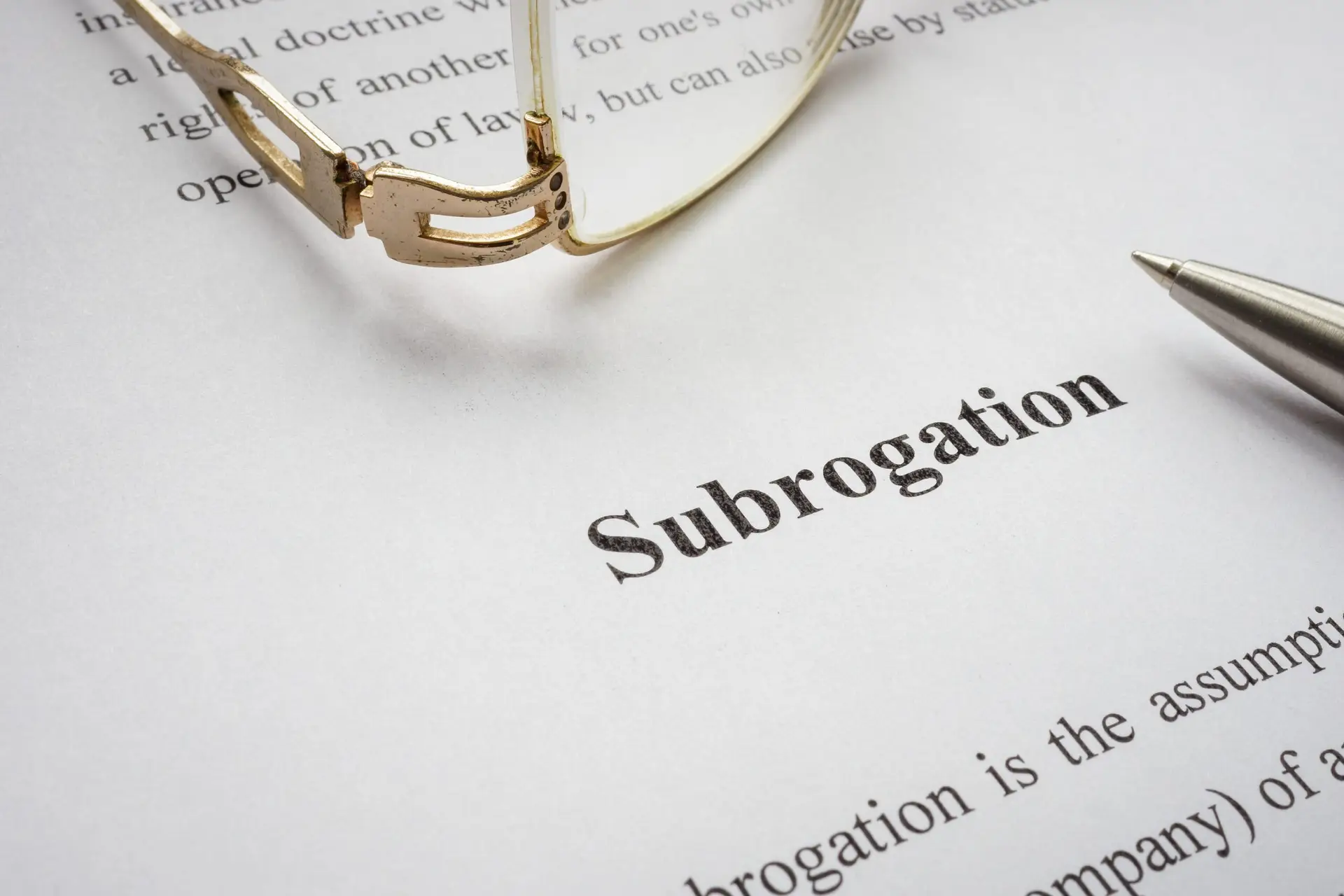Subrogation is the right of an insurance company or other interested party to receive reimbursement after they have covered a claim. This is common in motor vehicle accident claims where the victim’s insurance company pays out a claim, but a later personal injury case leads to monetary damages. The victim’s insurance company may seek reimbursement from the defendant or their insurance company for their costs. Subrogation can be difficult to understand, but an experienced personal injury attorney would have no issue with handling this aspect of the case.
Subrogation in Louisiana is a bit different than in many other states. Under its civil law system, several nuances can affect your case. Learn how subrogation can affect you and your personal injury lawsuit.
What Is Subrogation?
Subrogation occurs when one party substitutes for another’s legal right to collect monetary damages or a debt and enforces that right for their own benefit. Often shortened to “subro,” subrogation is most common when an insurance company is involved in your case. Insurance companies commonly pay out claims for their insureds, but another driver may ultimately be responsible for the accident. In these situations, the injured driver’s insurance company may seek reimbursement from the responsible party.
Consider the following example as an illustration of subrogation:
Jane is driving through Shreveport on her way to work. The weather is clear, and the sun is shining. She is in the highway’s left lane and legally passing a large semi-truck. The truck driver is exhausted after working an incredibly long shift, many hours over the limitation he is supposed to follow. The truck driver wants to pass another truck moving slowly in front of him.
The truck driver merges into the left lane without signaling or checking his mirrors. He slams into Jane’s car, sending her spiraling off the road and overturning. Jane is severely injured, requiring multiple surgeries and long-term rehabilitation. Her medical bills, lost income, and much more begin to pile up. Jane’s insurance company helps her pay for these expenses under Jane’s coverage policy.
Jane ultimately files a truck accident lawsuit against the truck driver and the trucking company. She wins a $250,000 settlement as a result of her damages. Jane’s insurance company subrogates her claim and seeks reimbursement from the defendants for the amount it paid to Jane. This is because the truck driver and trucking company should have paid originally, and Jane’s insurance company is entitled to reimbursement for the costs it incurred.
This example demonstrates a common situation. Injured victims with insurance often use it first to help with costs. The victim’s insurance company is entitled to seek reimbursement for the costs it paid.
Why Subrogation Exists
Subrogation claims exist for two primary reasons, both of which concern fairness. First is the principle that plaintiffs should not be able to win a “double recovery.” If an injured person’s insurance company pays for their damages, and the injured person also wins monetary damages, they would receive a windfall unless the insurance company can collect what it paid in advance. This creates a fairer system to avoid double recovery. It also helps to reduce insurance rates because insurance companies can be reimbursed for prepaid claims.
The second reason is simple fairness to the insurance company. A victim’s insurance company should not be punished for doing its job and protecting its insured. It paid claims that may really be owed by a negligent defendant and their liability insurance company. This “pre-payment” is meant to protect injured victims, so the insurance company is entitled to recover any costs that should be paid by other parties.
Liens in Personal Injury Cases
Subrogation may occur through a lien on a plaintiff’s personal injury winnings. This is common in jury verdicts or in settlements that did not involve the injured victim’s insurance company as part of the agreement. A lien is a legal interest or claim on those proceeds. It entitles the lien holder to enforce their legal rights and collect what they are owed.
Common liens in Louisiana personal injury claims include:
- Medicaid and Medicare liens: Government health care programs may file a lien against any personal injury proceeds to recoup costs spent on medical care.
- Health insurance liens: Private health insurance companies will typically file a lien on any proceeds to regain the initial costs they paid.
- Workers’ compensation liens: If the injured victim was harmed at work, workers’ compensation may have paid out benefits. If a third party was ultimately responsible, the workers’ compensation system might file a subrogation lien to recover any costs it covered.
- Medical liens: These are typically claimed by health care providers, especially for any costs not covered by health insurance. These include hospitals, rehabilitation clinics, and other entities that treat the victim’s injuries.
Handling a lien on personal injury proceeds should not be stressful or concerning. They are quite common and generally appropriate. The victim’s attorney can ensure any lien is valid and resolve any conflicts if they arise.
How Subrogation May Apply in a Personal Injury Case
Louisiana law is based on French civil law, while most states are based on English common law. As a result, Louisiana law is often more supportive of subrogation claims than many other states. Most Louisiana courts will accept a subrogation claim when it arises from third-party liability claims and settlements.
Dividing a Personal Injury Settlement or Award
Personal injury lawsuits are generally resolved by a settlement or through a trial verdict. In a settlement, the parties agree to a compensation amount in a legal contract. A trial verdict usually occurs after a jury hears a case and awards a monetary amount to the victim. In either case, plaintiffs often think this is the end. If subrogation applies, there will be additional steps the court and parties must complete.
The amount of the award is ultimately divided up in several ways. The total award amount helps to pay the victim’s costs, any outstanding debts, attorney’s fees, and court fees. The victim’s insurance company may also seek a portion of the total award to cover the actual costs it expended. This may require a separate subrogation action or occur as part of the settlement process. It is important for injured victims to speak with their attorneys about all of these matters so that they fully understand their legal rights.
State Assistance Benefits
If a victim’s insurance or other coverage is paid through a government program, subrogation still applies. This often happens when injured victims are covered by Medicaid or Medicare. Government programs will typically pursue subrogation of any claim the injured victim ultimately wins against third parties.
This happens in substantially the same way as private insurance companies, but some differences may apply. An experienced subrogation and personal injury attorney is prepared to handle these complications and nuances.
The One-Year Prescriptive Period for Louisiana Subrogation Claims
Louisiana law sets a time limit on subrogation claims. This is called a prescriptive period, more commonly called a statute of limitations in other states. Under Louisiana Civil Code Article 3492, any “delictual actions” — those causing harm to another person, their property, or their rights — must be subject to a “liberation prescription of one year.” This sets a one-year statute of limitations or prescriptive period for most tort cases. This will include cases such as motor vehicle crashes and other personal injury lawsuits.
Under most circumstances, a prescriptive period or statute of limitations starts on the day the accident or injury is sustained. In a car crash, for example, the one-year limitations period generally starts to run on the day of the accident. The injured person has one year from that date to file their claim. This is an especially short time period compared to most other states’ statutes of limitations.
Time Limits and the Impact on Subrogation Claims
This short statute of limitations period frequently affects the timing of subrogation claims. Many cases have delays in claim reporting, adjustment processes, and other reasons that take time to resolve a claim. Many personal injury accidents require lengthy investigations to determine who was at fault, especially in complicated multi-party litigation. An insurance company may not pay the insured within that one-year statute of limitations period. If no claim is made or paid out in that time, there is no claim to subrogate.
This means that insurance companies and subrogation attorneys were often caught in a difficult position. They had to comply with the short prescriptive period but were unable to do so because no actual claim yet existed. Many were forced to ignore perfectly valid claims because of this timing issue.
How the Corley Case Changed Louisiana Subrogation Claims
Louisiana case law finally addressed this critical issue in Corley Enterprises of Louisiana, Inc. v. Bear Creek Saloon, Inc. In that case, the court considered the issue and determined that subrogation parties could file after the one-year statute of limitations period under particular circumstances. The court ultimately found that insurance companies stand in the shoes of their insureds in subrogation claims. These companies acquire a legal right to assert the actions and rights of the plaintiff in the case. Based on that logic, the court found that subrogated insurers have the right to file a direct action against liability insurers that represent third parties.
The Corley case casts light on what this actually means. The insured injured victim, Corley, leased property to Bear Creek Saloon, a bar and restaurant. A fire started on Bear Creek’s premises, causing a total loss of the property and its contents. The fire occurred on April 26, 2014. Corley filed a Petition for Damages on April 15, 2015. This claim alleged multiple claims against several defendants.
Nearly three years after the fire and two years after the expiration of the statute of limitations period, Corley’s insurance companies filed an action on July 17, 2017, seeking subrogation against the named defendants. According to their lawsuit, they paid money to Corley and were entitled to reimbursement. One of the defendants objected to this new petition. They argued that the petition was not filed on time as it did not occur within the one-year period provided by law. The trial court granted this objection, and Corley’s insurance companies appealed.
The case then went to the First Circuit Court of Appeals. The court had to consider whether an insurer’s petition for intervention arising out of the same facts as the original case could be filed after the one-year period that applies to the original action. The court heard arguments about whether the prescriptive period was interrupted when the subrogation action arose from the same factual occurrence as that of the insured and whether the statute of limitations applies in these unique situations.
The court ultimately decided that Corley timely filed his original claim under the one-year prescriptive period. It also determined that the insurance companies paid money to Corley as a result of that fire for which defendants were ultimately held liable. The appeals court held that because the petition for subrogation arose from the same factual occurrence as that filed by Corley, they shared a single cause of action. The court further found that the limitations period was interrupted by Corley’s timely filing for purposes of pursuing subrogation.
This holding has a significant impact on subrogation claims in Louisiana. Many insurers can now file a subrogation claim beyond the typical one-year period so long as:
- The insurance company seeks subrogation
- The insured filed a timely action and won monetary damages
- The subrogation claim arises from the same factual occurrence as the insured’s lawsuit and involves a single cause of action
Understand Subrogation Claims in Louisiana
Subrogation can seem complicated for many injured victims. How it applies in each individual case differs significantly. A highly qualified personal injury attorney can explain how subrogation may impact your specific case.
Sources:
- Louisiana State Legislature. CC 3492, Liberative Prescription, One Year Prescription. Art. 3492, Delictual Actions.
- Corley Enterprises of Louisiana, Inc. v. Bear Creek Saloon, Inc., 2018-1147 , 273 So.3d 1236 (La. App. 1 Cir. 2/28/19).





